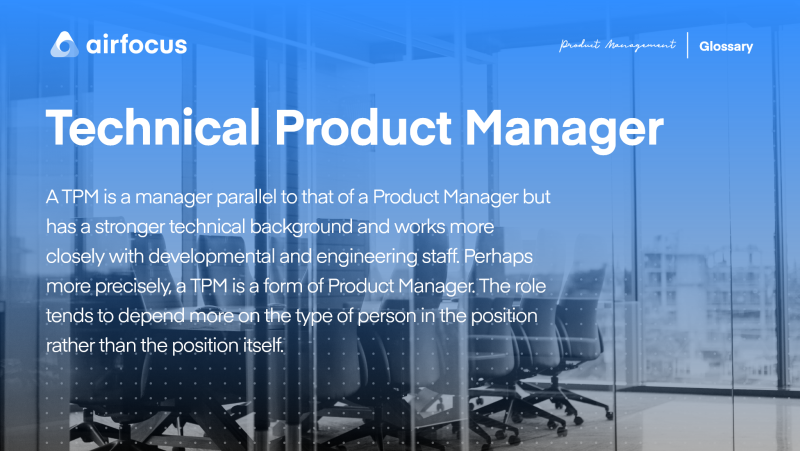Technical Product Manager (TPM)
What is the technical product manager (TPM)?
Definition of a technical product manager (TPM)
A TPM is a manager parallel to that of a product manager but has a stronger technical background and works more closely with developmental and engineering staff. Perhaps more precisely, a TPM is a form of product manager. The role tends to depend more on the type of person in the position rather than the position itself.
A TPM is someone who works on a technological product and not simply a product manager who is required to perform technical tasks. Ultimately, a business may label the role of being a technical product manager rather than just product manager because they need to attract candidates with a specific skill set or experience.
The existence of the TPM role is sometimes dependent on the size of the business. In a smaller organization titles tend to be more fluid as the workforce has to fulfill changing roles as and when the need arises. As a business expands, roles can become more specialized hence there being a greater need for a TPM.
What does a technical product manager do?
A technical product manager is essentially still a product manager and can be said to have the same responsibilities: they have to drive the development of the product or product line and are responsible for its success or failure.
They will be responsible for harvesting consumer data and also define the strategic objectives of the project. They have to make sure the product stays aligned with the vision and strategic aims of the business, is responsive to the demands of the marketplace, and retains flexibility and integrates consumer feedback.
The product manager must also direct the technological, financial, and staff resources of the business in a manner that best supports the development of the product.
Despite their technical moniker, the TPM must maintain the same relationship with the development team, senior management and leadership, and all wider stakeholders as that of the project manager.
Further natural development of the technical product manager role is to adopt ownership of particular aspects of the product’s development. Their more technical persuasion too might also mean they are used on an impromptu basis to confer on technical issues.
On the whole, a more technically minded person managing the product may have a better grasp on areas of development such as technical specifications, engineering estimates, the architecture of the networks being used, inadvertent and planned technical debt, security requirements, and knowledge of competitors within the marketplace.
A product manager’s knowledge should still have some depth in these areas, but should a project become larger and more complex, the added technical expertise of a TPM will be a bonus.
An inevitable outcome of the technical product manager’s greater in-depth knowledge of those areas mentioned above is enhanced communication. It stands to reason that the TPM will have an advantage when being able to more comprehensively understand the language of the workforce. Interpreting the needs and issues of team members can only result in the faster communication of information to where it needs to be, or indeed, acting to create a solution at the coal face.
Where a business employs both a TPM and a product manager, the latter will tend to focus on higher-level issues and strategic planning compared to the former that will be involved in the technical implementation of initiatives.
It is worthy of note that where a business solely employs a TPM, there is an increased danger that the role will evolve to be closer to the day-to-day tactical work and tasks of engineers and developers. As a result, the TPM can lose sight of the product’s strategic objectives. It is perhaps ideal for a business then, where possible, to employ both a product manager and a TPM to get the best of both worlds.

General FAQ

Glossary categories
Experience the new way of doing product management

Experience the new way of doing product management








